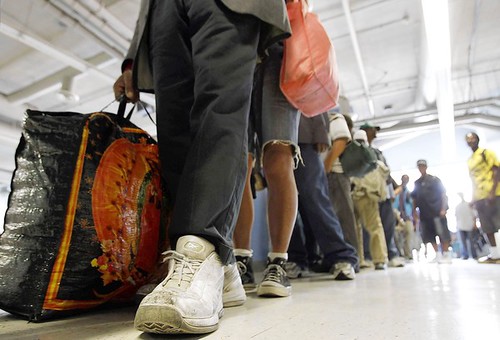
Men line up for free lunches at the Union Rescue Mission in downtown Los Angeles on Tuesday, Sept. 13, 2011. New census data shows the national poverty rate has increased to levels not seen since 1993., a photo by Pan-African News Wire File Photos on Flickr.
Study: 'Extreme' poverty in US has more than doubled
Thu Mar 8, 2012 3:0AM GMT
presstv.ir
A combination of joblessness due to the Great Recession and welfare reform meant to encourage work has led to more than a doubling of "extreme" poverty in the United States, a new study has found.
Using a World Bank definition usually applied to developing countries, the National Poverty Center found that the number of households getting by on less than $2 per person, per day increased to 1.46 million households in 2011 from 636,000 in 1996, a climb of more than 129 percent.
The study, done by researchers at the University of Michigan, considered only cash income. Once they took into account the impact of food stamps, the extreme poverty rate is still up by 67.4 percent, measured as homes that fell below the $2 per person daily threshold on a monthly basis. moneynews.com
FACTS & FIGURES
Three years after the onset of the financial and economic crisis, hunger remains high in the United States. The financial and economic crisis that erupted in 2008 caused a dramatic increase in hunger in the United States. This high level of hunger continues in 2010, according to the latest government report (with the most recent statistics) released in September 2011
(Coleman-Jensen 2011). worldhunger.org
In 2010, 17.2 million households, 14.5 percent of households (approximately one in seven), were food insecure, the highest number ever recorded in the United States. alternet.org
In 2010, 46.9 million people were in poverty, up from 37.3 million in 2007 -- the fourth consecutive annual increase in the number of people in poverty . This is the largest number in the 52 years for which poverty rates have been published.
examiner.com
In 2011 the Census Bureau published a supplemental poverty measure for the first time (US Census Bureau 2011b). This new measure addresses seven concerns that have been raised about the official poverty measure, including the fact that the official poverty measure does not reflect the effects of key government policies that alter the disposable income of families and thus their poverty status, such as the SNAP/food stamp program.
worldhunger.org
No comments:
Post a Comment